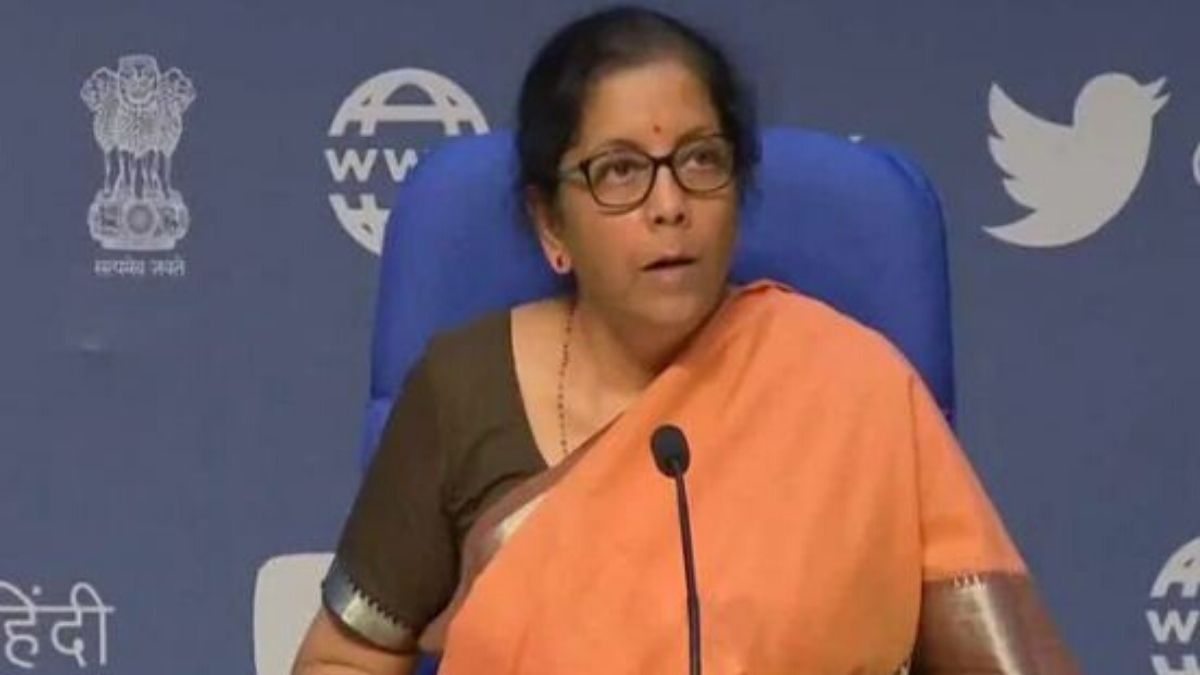
A day after Prime Minister Narendra Modi announced a Rs 20 lakh crore economic stimulus package, Finance Minister Nirmala Sitharaman, on Wednesday, announced a slew of measures to give boost to sectors such as MSME, real estate and power discoms, among others. In her opening remarks, the FM said that the tranche had 16 different measures.
Six of these are for the Ministry of Micro, Small and Medium Enterprises (MSMEs), two are for Employees Provident Fund (EPF), two for non-banking financial companies (NBFCs) and microfinance institutions (MFIs), one for discoms, one for contractors, one for real estate, and three are tax measures. Elaborating further, she said that essentially the goal is to build a self-reliant India, which is why the economic package is called the Aatma Nirbhar Bharat Abhiyaan.
Citing the five pillars that comprise the package, she added that the focus of the government would be on land, labour, liquidity and law. According to the FM, the Prime Minister laid out a comprehensive vision, which was laid out after wide consultations with different sections of society.
She added that she would be detailing the PM’s vision of self-reliant India over the next few days. The primary measures announced by the Finance Minister comprised six steps to boost the MSME sector. The first step is a collateral free loan of Rs 3 lakh crore for businesses including MSMEs. These loans will have a four-year tenure, with a moratorium of 12 months on principal repayment. This will be available to units with up to Rs 25 core outstanding and a turnover of up to Rs 100 crore.
The units will not have to provide any guarantee or collateral of their own and the said amount will be 100% guaranteed by Government of India. This move will help more than 45 lakh MSMEs. The second step will be to help MSMEs that are stressed or NPAs. Government has announced that these MSMEs will get a subordinate debt of Rs 20,000 crore. The Central government will give a partial guarantee of Rs 4,000 crore and this move will help 2 lakh MSMEs.
The third step is called Fund of Funds and under this, NPAs that are in good financial condition and want to expand their production, for them a sum of Rs 50,000 crore has been allocated through equity. The fourth step is that the government has changed the definition of MSME by raising their investment limit. According to the FM, until now a company was called micro if the investment limit was Rs 25 lakh.
Now this limit has been increased to Rs 1 crore, with a turnover of Rs 5 crore. In the same way, the limit of investment in small MSMEs has been increased to under Rs 10 crore, with a turnover under Rs 50 crore. Medium MSME enterprises will be those with an investment of Rs 20 crore and a turnover less than Rs 100 crore. The fifth step is being seen as a step towards self-reliance and support to “Make in India”.
The government announced that global tenders would be disallowed in government’s procurement tenders up to Rs 200 crore. This will help MSMEs to increase their business. The sixth and final step would be that Government of India and all Central public sector enterprises would pay whatever payment is due in the next 45 days. According to experts, this amount is approximately Rs 50,000 crore.
EPF
To ease financial stress, the government has decided to continue EPF support for businesses and workers for three more months. This step will provide a liquidity relief of Rs 2,500 crore. According to the Finance Minister, this move will benefit around 3.6 lakh establishments and 72.22 lakh employees. Apart from this, the statutory PF contribution by an employer and employee has been reduced to 10% and this will result in giving a liquidity relief of Rs 6,750 crore.
NBFCs, HFCs and MFIs
The government has launched a Rs 30,000 crore special liquidity scheme for non-banking financial companies, micro finance companies and housing finance companies. Apart from this, for NBFCs, government has announced a loan of Rs 45,000 crore through a partial credit guarantee scheme. In this, the loss of initial 20% will be borne by the Central government.
DISCOM
A sum of Rs 90,000 crore, in two equal instalments, will be given to discoms facing unprecedented cash flow problem. This will be given through PFC and REC. CPSE and GENCOs will pass this rebate to those discom companies that are passing on the relief to the consumer.
REAL ESTATE
Calling on the Ministry of Housing and Urban Affairs to advice states/ UTs and their regulatory authorities to treat Covid-19 as an event of Force Majeure (Act of God), Finance Minister Nirmala Sitharaman said that registration and completion date of all registered projects, expiring on or after 25 March, should be suo moto extended by six months. The minister added that these measures will de-stress real estate developers and ensure completion of projects so that homebuyers are able to get delivery of their booked homes with new timelines.
CONTRACTORS
All Central agencies like Railways and Ministry of Road Transport and Highways and CPWD will give extensions of up to six months, without cost to contractor, to complete their projects.
TAX RELATED MEASURES
A reduction of 25% for rates of tax deduction at source (TDS) and tax collected at source for a period up to 31 March 2021 was announced. This step will provide liquidity to the tune of Rs 50,000 crore. The due date for income tax returns for the year 2019-20 has been extended to 30 November 2020.